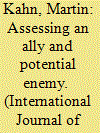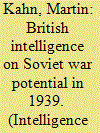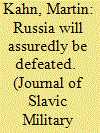| Srl | Item |
| 1 |
ID:
134899


|
|
|
|
|
| Summary/Abstract |
When the Soviet Union and the United States became potential enemies at the end of World War II increased U.S. resources were spent on trying to better understand the USSR's economy and society. As the Cold War escalated in the immediate post-war years new U.S. organizations were created to analyze the USSR. Studies have been conducted about U.S. government assessments of the USSR during the Cold War, for example regarding the Central Intelligence Agency's (CIA) estimates of Soviet capabilities and intentions. 1 But the United States had already been trying to assess Soviet capabilities before the onset of the Cold War, and these efforts were of particular interest during World War II, when Soviet resources were being used against a common enemy: the Axis Powers.
|
|
|
|
|
|
|
|
|
|
|
|
|
|
|
|
| 2 |
ID:
124122


|
|
|
|
|
| Publication |
2013.
|
| Summary/Abstract |
The British government tried to create a peace front against German aggression in 1939 and the inclusion of the Soviet Union was controversial. This article investigates British intelligence on Soviet war potential in 1939 with the aim of comparing intelligence to reality, placing intelligence in context by following the British government discussion, commenting on earlier research about British intelligence on Soviet war potential and trying to find explanations for the fact that intelligence was far from reality. British assessments were of importance and earlier research is amended.
|
|
|
|
|
|
|
|
|
|
|
|
|
|
|
|
| 3 |
ID:
124341


|
|
|
|
|
| Publication |
2013.
|
| Summary/Abstract |
At the beginning of the Soviet-German war in June 1941 most Anglo-American Government officials believed in a swift collapse of Soviet resistance. When the collapse did not materialize assessments gradually changed and a more realistic outlook on Soviet war potential was eventually produced. But it was not until the late summer of 1943 that the Anglo-Americans finally believed in a more sustained Red Army offensive effort against the Germans, and even then US observers still underestimated Soviet strength. During the whole period 1941-1943 British observers generally had a relatively more realistic apprehension of Soviet capabilities. The Anglo-American perceptions and the change in perceptions, considering the whole context of World War II, had implications for the Western Allied war effort.
|
|
|
|
|
|
|
|
|
|
|
|
|
|
|
|
| 4 |
ID:
121006


|
|
|
|
|
| Publication |
2012.
|
| Summary/Abstract |
An understanding of why almost all Anglo-American Government officials believed in a Soviet defeat as a result of a German attack can be reached by analyzing US and British Government sources (State Department, Foreign Office, Military, and other) from 1939-41. The sources reveal much detail about the perceived weakness of Soviet war potential, and in what specific respects the Anglo-Americans underestimated Soviet strength. The assessments were in most cases far from reality and as much about economic shortcomings as about military weakness.
|
|
|
|
|
|
|
|
|
|
|
|
|
|
|
|